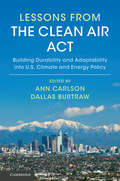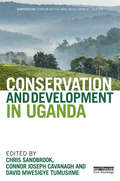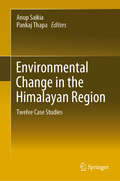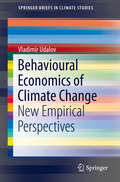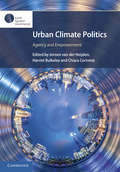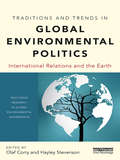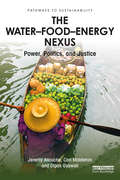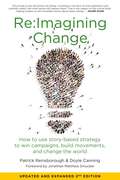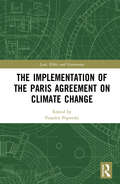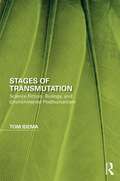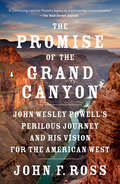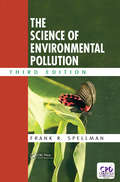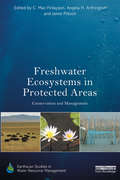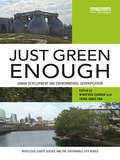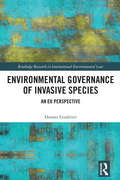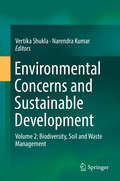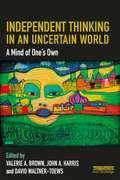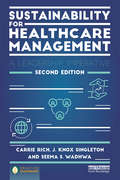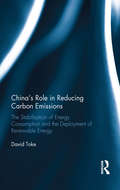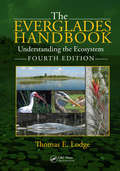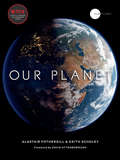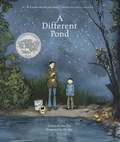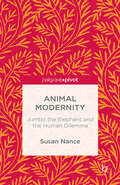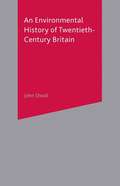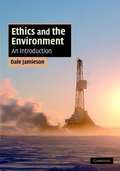- Table View
- List View
Lessons from the Clean Air Act: Building Durability and Adaptability into US Climate and Energy Policy
by Dallas Burtraw Ann CarlsonClimate and energy policy needs to be durable and flexible to be successful, but these two concepts often seem to be in opposition. One venerable institution where both ideas are apparent is the Clean Air Act, first passed by the United States Congress in 1963, with amendments in 1970 and 1990. The Act is a living institution that has been hugely successful in improving the environment. It has programs that reach across the entire economy, regulating various sectors and pollutants in different ways. This illuminating book examines these successes - and failures - with the aim to offer lessons for future climate and energy policymaking in the US at the federal and state level. It provides critical information to legislators, regulators, and scholars interested in understanding environmental policymaking.
Conservation and Development in Uganda (Earthscan Conservation and Development)
by Chris Sandbrook Connor Joseph Cavanagh David Mwesigye TumusiimeUganda has extensive protected areas and iconic wildlife (including mountain gorillas), which exist within a complex social and political environment. In recent years Uganda has been seen as a test bed and model case study for numerous and varied approaches to address complex and connected conservation and development challenges. This volume reviews and assesses these initiatives, collecting new research and analyses both from emerging scholars and well-established academics in Uganda and around the globe. Approaches covered range from community-based conservation to the more recent proliferation of neoliberalised interventions based on markets and payments for ecosystem services. Drawing on insights from political ecology, human geography, institutional economics, and environmental science, the authors explore the challenges of operationalising truly sustainable forms of development in a country whose recent history is characterised by a highly volatile governance and development context. They highlight the stakes for vulnerable human populations in relation to of large and growing socioeconomic inequalities, as well as for Uganda’s rich, unique, and globally significant biodiversity. They illustrate the conflicts that occur between competing claims of conservation, agriculture, tourism, and the energy and mining industries. Crucially, the book draws out lessons that can be learned from the Ugandan experience for conservation and development practitioners and scholars around the world.
Environmental Change in the Himalayan Region: Twelve Case Studies
by Anup Saikia Pankaj ThapaThe book focuses on environment and conservation issues pertaining to the Himalayas, spanning Pakistan, Nepal, India, Bhutan and Myanmar. Environmental degradation, changes in snow cover and glaciers in India-Bhutan, threats to protected areas, and biodiversity in this ecologically fragile region are assessed in twelve distinct, regional case studies.
Behavioural Economics of Climate Change: New Empirical Perspectives (Springerbriefs In Climate Studies)
by Vladimir UdalovThis book investigates various kinds of climate change mitigation behaviour, which range from a general support of environmental policy to concrete energy-saving activities, in selected countries. Drawing on extensive national and international survey data, the analysis has the following main objectives: to identify potential determinants of individuals’ renewable energy support, and to analyse the impact of experiences with natural disasters on individuals’ choice between economic growth and environmental protection. Moreover, it examines the role of environmental motivations behind direct daily energy-saving behaviour. The empirical results reveal that various types of climate change mitigation behaviour are not only driven by a mixture of environmental and non-environmental/economic motivations but also depend on external circumstances such as natural disasters. Since CO2 emission dynamics stem to some extent from the choices people make every day in their roles as consumers, investors and citizens, the new findings presented are also valuable from a policy perspective.
Urban Climate Politics: Agency and Empowerment
by Harriet Bulkeley Chiara Certomà Jeroen van der HeijdenSince the 1990s, a burgeoning literature has emerged on the politics and governance of urban climate. It is now evident that urban responses to climate change involve a diverse range of actors as well as forms of agency that cross traditional boundaries, and which have diverse consequences for (dis)empowering different social groups. This book provides an overview of the forms of agency in urban climate politics, discussing the friction and power dynamics between them. Written by renowned scholars, it critically assesses the advantages and limitations of increasing agency in urban climate governance. In doing so, it sheds critical new light on the existing literature, advances the state of knowledge of urban climate governance and discusses ways to accelerate urban climate action. With chapters building on case studies from across the world, it is ideal for scholars and practitioners working in the area of urban climate politics and governance.
Traditions and Trends in Global Environmental Politics: International Relations and the Earth (Routledge Research in Global Environmental Governance)
by Hayley Stevenson Olaf CorryHow can a divided world share a single planet? As the environment rises ever higher on the global agenda, the discipline of International Relations (IR) is engaging in more varied and transformative ways than ever before to overcome environmental challenges. Focusing in particular on the key trends of the past 20 years, this volume explores the main developments in the global environmental crisis, with each chapter considering an environmental issue and an approach within IR. In the process, adjacent fields including energy politics, science and technology, and political economy are also touched on. Traditions and Trends in Global Environmental Politics is aimed at anybody interested in the key international environmental problems of the day, and those seeking clarification and inspiration in terms of approaches and theories that decode how the environment is accounted for in global politics. It will be an essential resource for students and scholars of global environmental politics and governance, environmental studies and IR.
The Water–Food–Energy Nexus: Power, Politics, and Justice (Pathways to Sustainability)
by Carl Middleton Dipak Gyawali Jeremy AlloucheThe world of development thinkers and practitioners is abuzz with a new lexicon: the idea of "the nexus" between water, food, and energy which is intuitively compelling. It promises better integration of multiple sectoral elements, a better transition to greener economies, and sustainable development. However, there appears to be little agreement on its precise meaning, whether it only complements existing environmental governance approaches or how it can be enhanced in national contexts. One current approach to the nexus treats it as a risk and security matter while another treats it within economic rationality addressing externalities across sector. A third perspective acknowledges it as a fundamentally political process requiring negotiation amongst different actors with distinct perceptions, interests, and practices. This perspective highlights the fact that technical solutions for improving coherence within the nexus may have unintended and negative impacts in other policy areas, such as poverty alleviation and education. The Water–Food–Energy Nexus: Power, Politics and Justice lays out the managerial-technical definitions of the nexus and challenges these conceptions by bringing to the forefront the politics of the nexus, around two key dimensions – a dynamic understanding of water–food–energy systems, and a normative positioning around nexus debates, in particular around social justice. The authors argue that a shift in nexus governance is required towards approaches where limits to control are acknowledged, and more reflexive/plural strategies adopted. This book will be of interest to academic researchers, policy makers, and practitioners in the fields of international development studies, environmental politics, and science and technology studies, as well as international relations.
Re: How to Use Story-based Strategy to Win Campaigns, Build Movements and Change the World
by Doyle Canning Patrick ReinsboroughThis unique book explores how culture, media, memes and narrative intertwine with social change strategies, and offers practical methods to amplify progressive causes in the popular culture.
The Implementation of the Paris Agreement on Climate Change (Law, Ethics and Governance)
by Vesselin PopovskiIn December 2015, 196 parties to the United Nations Framework Convention on Climate Change (UNFCCC) adopted the Paris Agreement, seen as a decisive landmark for global action to stop human- induced climate change. The Paris Agreement will replace the 1997 Kyoto Protocol which expires in 2020, and it creates legally binding obligations on the parties, based on their own bottom-up voluntary commitments to implement Nationally Determined Contributions (NDCs). The codification of the climate change regime has advanced well, but the implementation of it remains uncertain. This book focuses on the implementation prospects of the Agreement, which is a challenge for all and will require a fully comprehensive burden- sharing framework. Parties need to meet their own NDCs, but also to finance and transfer technology to others who do not have enough. How equity- based and facilitative the process will be, is of crucial importance. The volume examines a broad range of issues including the lessons that can be learnt from the implementation of previous environmental legal regimes, climate policies at national and sub-national levels and whether the implementation mechanisms in the Paris Agreement are likely to be sufficient. Written by leading experts and practitioners, the book diagnoses the gaps and lays the ground for future exploration of implementation options. This collection will be of interest to policy-makers, academics, practitioners, students and researchers focusing on climate change governance.
Stages of Transmutation: Science Fiction, Biology, and Environmental Posthumanism (Perspectives on the Non-Human in Literature and Culture)
by Tom IdemaStages of Transmutation: Science Fiction, Biology, and Environmental Posthumanism develops the theoretical perspective of environmental posthumanism through analyses of acclaimed science fiction novels by Greg Bear, Octavia Butler, Kim Stanley Robinson, and Jeff VanderMeer, in which the human species suddenly transforms in response to new or changing environments. Narrating dramatic ecological events of human-to-nonhuman encounter, invasion, and transmutation, these novels allow the reader to understand the planet as an unstable stage for evolution and the human body as a home for bacteria and viruses. Idema argues that by drawing tension from biological theories of interaction and emergence (e.g. symbiogenesis, epigenetics), these works unsettle conventional relations among characters, technologies, story-worlds, and emplotment, refiguring the psychosocial work of the novel as always already biophysical. Problematizing a desire to compartmentalize and control life as the property of human subjects, these novels imagine life as an environmentally mediated, staged event that enlists human and nonhuman actors. Idema demonstrates how literary narratives of transmutation render biological lessons of environmental instability and ecological interdependence both meaningful and urgent—a vital task in a time of mass extinction, hyperpollution, and climate change. This volume is an important intervention for scholars of the environmental humanities, posthumanism, literature and science, and science and technology studies.
The Promise of the Grand Canyon: John Wesley Powell's Perilous Journey and His Vision for the American West
by John F. RossA timely, thrilling account of a man who, as an explorer, dared to lead the first successful expedition down the Colorado through the Grand Canyon--and, as an American visionary, waged a bitterly-contested campaign for environmental sustainability in the American West.When John Wesley Powell became the first person to navigate the entire Colorado River, through the Grand Canyon, he completed what Lewis and Clark had begun nearly 70 years earlier--the final exploration of continental America. The son of an abolitionist preacher, a Civil War hero (who lost an arm at Shiloh), and a passionate naturalist and geologist, in 1869 Powell tackled the vast and dangerous gorge carved by the Colorado River and known today (thanks to Powell) as the Grand Canyon. With The Promise of the Grand Canyon, John Ross recreates Powell's expedition in all its glory and terror, but his second (unheralded) career as a scientist, bureaucrat, and land-management pioneer concerns us today. Powell was the first to ask: how should the development of the west be shaped? How much could the land support? What was the role of the government and private industry in all of this? He began a national conversation about sustainable development when most everyone else still looked upon land as an inexhaustible resource. Though he supported irrigation and dams, his prescient warnings forecast the 1930s dustbowl and the growing water scarcities of today. Practical, yet visionary, Powell didn't have all the answers, but was first to ask the right questions.
The Science of Environmental Pollution
by Frank R. SpellmanThis new edition of The Science of Environmental Pollution presents common-sense approaches and practical examples based on scientific principles, models, and observations, but keeps the text lively and understandable for scientists and non-scientists alike. It addresses the important questions regarding environmental pollution: What is it? What is its impact? What are the causes and how can we mitigate them? But more than this, it stimulates new ways to think about the issues and their possible solutions. This third edition has been updated throughout, and contains new information on endocrine disruptors in drinking water, contaminated sediments in surface waters, hydraulic fracturing wastewater, and more. Also, it will include new case studies, examples, and study questions. Environmental issues continue to attract attention at all levels. Some sources say that pollution is the direct cause of climate change; others deny that the possibility even exists. This text sorts through the hyperbole, providing concepts and guidelines that not only aid in understanding the issues, but equip readers with the scientific rationale required to make informed decisions.
Freshwater Ecosystems in Protected Areas: Conservation and Management (Earthscan Studies in Water Resource Management)
by Angela H. Arthington Jamie Pittock C. Max FinlaysonFreshwater ecosystems have the greatest species diversity per unit area and many endangered species. This book shows that, rather than being a marginal part of terrestrial protected area management, freshwater conservation is central to sustaining biodiversity. It focuses on better practices for conserving inland aquatic ecosystems in protected areas, including rivers, wetlands, peatlands, other freshwater and brackish ecosystems, and estuaries. The authors define inland aquatic ecosystems, showing just how diverse and widespread they are. They examine the principles and processes that are essential for the conservation of freshwater ecosystems and aquatic species. Major categories of threats to freshwater ecosystems and the flow-on implications for protected area design are described. Practical case studies are used to illustrate principles and practices applied around the world. Specific management needs of the main types of freshwater ecosystems are considered, as well as the management of freshwaters in the broader landscape, showing how natural resource governance processes can be harnessed to better manage freshwater biodiversity. The book offers commentary on how to adapt freshwater conservation practices to climate change and ends with an insightful synthesis.
Just Green Enough: Urban Development and Environmental Gentrification (Routledge Equity, Justice and the Sustainable City series)
by Winifred Curran Trina HamiltonWhile global urban development increasingly takes on the mantle of sustainability and "green urbanism," both the ecological and equity impacts of these developments are often overlooked. One result is what has been called environmental gentrification, a process in which environmental improvements lead to increased property values and the displacement of long-term residents. The specter of environmental gentrification is now at the forefront of urban debates about how to accomplish environmental improvements without massive displacement. In this context, the editors of this volume identified a strategy called "just green enough" based on field work in Greenpoint, Brooklyn, that uncouples environmental cleanup from high-end residential and commercial development. A "just green enough" strategy focuses explicitly on social justice and environmental goals as defined by local communities, those people who have been most negatively affected by environmental disamenities, with the goal of keeping them in place to enjoy any environmental improvements. It is not about short-changing communities, but about challenging the veneer of green that accompanies many projects with questionable ecological and social justice impacts, and looking for alternative, sometimes surprising, forms of greening such as creating green spaces and ecological regeneration within protected industrial zones. Just Green Enough is a theoretically rigorous, practical, global, and accessible volume exploring, through varied case studies, the complexities of environmental improvement in an era of gentrification as global urban policy. It is ideal for use as a textbook at both undergraduate and graduate levels in urban planning, urban studies, urban geography, and sustainability programs.
Environmental Governance of Invasive Species: An EU Perspective (Routledge Research In International Environmental Law Ser.)
by Donato GualtieriThe consequences of the introduction and spread of invasive alien species in non-native ecosystems is an area of growing interest for international policymakers and regulators. Globalisation has increased the rate and magnitude of biological invasions, resulting in huge environmental, economic and social costs. Until recently, the effectiveness of international efforts to provide a coordinated response to the threat of alien invasions have been limited. This book considers the existing Multilateral Environmental Agreements and looks at the potential role of regional environmental governance, particularly in consideration of the adoption of the European Parliament and Council regulation 1143/2014 on the management and control of invasive species, to provide an effective response to this global threat.
Environmental Concerns and Sustainable Development: Volume 2: Biodiversity, Soil and Waste Management
by Narendra Kumar Vertika ShuklaThe current global environmental crisis is primarily the result of non-standardized parameters for environmental regulation, and is impacting e.g. clean air, safe drinking water and the quality of food, particularly in developing nations. Due to their poor/lax execution of EIA protocols, newly developing countries are preferred destinations for establishing pollution-emitting industries, which results in the degradation and depletion of their natural resources. Lack of environmental policy intervention is another major incentive to base “dirty” industries in these nations. In order to ensure sustainable development, the highest-priority issues include the monitoring and eradication of environmental problems stemming from economic development; virtually every form of economic development primarily results in the loss of forests and thus biodiversity, followed by declining air quality and the contamination of natural resources. Sustainable development ensures responsible interactions with the environment, so as to minimize the depletion or degradation of natural resources and preserve environmental quality. It involves integrated approaches to understanding the importance of environmental management systems and policy measures that lead to improved environmental performance. This book addresses the environmental concerns associated with economic development, and with approaches to attaining sustainable economic development, which include monitoring the quality of water resources, soil erosion and degradation of the natural environment.
Independent Thinking in an Uncertain World: A Mind of One’s Own
by David Waltner-Toews Valerie A. Brown John A. HarrisAny effective response to an uncertain future will require independently thinking individuals working together. Human ideas and actions have led to unprecedented changes in the relationships among humans, and between humans and the Earth. Changes in the air we breathe, the water we drink and the energy we use are evidence of Nature – which has no special interest in sustaining human life – looking out for itself. Even the evolutionary context for humans has altered. Evolutionary pressures from the digital communication revolution have been added to those from natural systems. For humans to meet these challenges requires social re-organisation that is neither simple nor easy. Independent Thinking in an Uncertain World explores workable, field-tested strategies from the frontiers of creating a viable future for humans on Earth. Based on research results from hundreds of social learning workshops with communities worldwide, many of them part of Australian National University’s Local Sustainability Project, authors with diverse interests explore the gap between open-minded individual thinking and closed socially defined knowledges. The multiple dimensions of individual, social and biophysical ways of thinking are combined in ways that allow open-minded individuals to learn from one another.
Sustainability for Healthcare Management: A Leadership Imperative
by Carrie R. Rich J. Knox Singleton Seema S. WadhwaSustainability is not unique to health, yet sustainability is a unique vehicle for promoting healthy values. This book challenges healthcare leaders to think through the implications of our decisions from fiscal, societal and environmental perspectives. It links health values with sustainability drivers in order to enlighten leadership about the value of sustainability as we move toward a new paradigm of health. Fully updated for the second edition, the book now includes case studies about: Waste disposal and cost Chemicals of concern Cost of water Green building ratings This book is a unique resource for researchers, students and professionals working in health and healthcare management because the book connects key concepts of environmental sustainability with healthcare operations. Readers will gain an appreciation for translating leadership priorities into sustainability tactics with beneficial operational outcomes.
China’s Role in Reducing Carbon Emissions: The Stabilisation of Energy Consumption and the Deployment of Renewable Energy
by David TokeChina, a still developing economy comprising a fifth of the world’s population, will play a key role in the global movement towards reducing carbon emissions. The aims of the Paris Agreement may stand or fall with China, both for its own contribution and the example it will set the developing world. China’s Role in Reducing Carbon Emissions discusses the prospects for China achieving radical reductions in carbon emissions, within the context of the current economic and political landscape. With a particular focus on technologies such as such as wind power, solar power and electric vehicles, Toke examines how China is transitioning to a state of stable energy consumption via a service-based economy and heavy investment in non-fossil energy sources. The book concludes that China may be set to reduce its carbon emissions by approximately two-thirds by 2050. This book is a valuable resource for students and scholars of climate change, sustainable development, political science and energy, as well as energy professionals seeking to understand the implications of recent developments in China.
The Everglades Handbook: Understanding the Ecosystem, Fourth Edition
by Thomas E. Lodge"This fourth edition covers the key subjects of previous editions with major updates of the new science and understanding. If there ever was a necessary book for Everglades advocates, students, authors, members of government and their agencies, The Everglades Handbook: Understanding the Ecosystem is an absolute must!" —Nathaniel P. Reed, from the Foreword “This book is far and away the best guide now in print to Everglades issues -- authoritative, well-illustrated, well-indexed, and readable." — Martha Musgrove, retired Miami Herald journalist, founding President of the Decision Makers Forum, and Southeast Regional Director of the Florida Wildlife Federation "Given the astonishing breadth and depth of scientific activities in the Everglades, Tom Lodge once again illustrates his savvy as an articulate science writer in condensing the complex dynamics of this remarkable ecosystem. …In summary, the Handbook reviews a vast literature into a compelling read about the natural treasures of the Everglades."—Evelyn E. Gaiser, Executive Director, School of Environment, Arts and Society, and Associate Dean, College of Arts & Sciences, Florida International University, modified from Wetlands (2011) 31 _____________________________________________________________________________________ The fourth edition presents expanded treatment of subjects where our knowledge of the Everglades and its restoration has greatly improved. This more detailed coverage includes: Computer modeling and its applications to the Everglades environment Quantified role of water flow in shaping the Everglades landscape The origin and evolution of fixed tree islands Sulfur and related mercury as wetland pollutants Up-to-date summary of the now quantified economic benefits of restoration, shown to be far in excess of the cost The Everglades Handbook: Understanding the Ecosystem, Fourth Edition is a scholarly reference packed cover to cover with scientific information about the ecosystem of the Everglades - taking into account how drastically the Everglades has changed. Topically, the book covers disciplines ranging from ecology, geology, climatology, hydrology, anthropology to conservation biology. Written in Tom Lodge’s trademark accessible style, this extensively researched text is essential reading for anybody trying to understand the challenges we face in restoring this unique ecosystem.
Our Planet: And Our Planet's Surprising Future
by Fred Pearce Alastair Fothergill Keith ScholeyWith a foreword by Sir David Attenborough, this is the striking photographic companion to the groundbreaking NETFLIX original documentary series, presenting never-before-seen visuals of nature's most intriguing animals in action and the environmental change that has to be seen to be believed.With six hundred members of crew filming in fifty countries over four years, the directors that brought us the original Planet Earth and Blue Planet now take readers on a journey across all the globe’s different biological realms to present stunning visuals of nature's most intriguing animals in action, and environmental change on a scale that must be seen to be believed. Featuring some of the world's rarest creatures and previously unseen parts of the Earth―from deep oceans to remote forests to ice caps―Our Planet takes nature-lovers deep into the science of our natural world. Revealing the most amazing sights on Earth in unprecedented ways, alongside stories of the ways humans are affecting the world’s ecosystems―from the wildebeest migrations in Africa to the penguin colonies of Antarctica―this book places itself at the forefront of a global conversation as we work together to protect and preserve our planet. With a keepsake package featuring debossing and foil stamping, this groundbreaking coffee-table book reveals the most amazing sights on Earth in unprecedented ways.
A Different Pond (Fiction Picture Books)
by Bao PhiAcclaimed poet Bao Phi delivers a powerful, honest glimpse into a relationship between father and son and between cultures, old and new. <P><P>A Different Pond is an unforgettable story about a simple event—a long-ago fishing trip. <P><P>As a young boy, Bao Phi awoke early, hours before his father's long workday began, to fish on the shores of a small pond in Minneapolis. Unlike many other anglers, Bao and his father fished for food, not recreation. A successful catch meant a fed family. Between hope-filled casts, Bao’s father told him about a different pond in their homeland of Vietnam. <P><P>The New York Times has said that Bao Phi’s poetry “rhymes with the truth.” Together with graphic novelist Thi Bui’s striking, evocative art, Phi’s expertly crafted prose reflects an immigrant family making its way in a new home while honoring its bonds to the past.
Animal Modernity: Jumbo The Elephant And The Human Dilemma
by Susan NanceThe concept of 'modernity' is central to many disciplines, but what is modernity to animals? Susan Nance answers this question through a radical reinterpretation of the life of Jumbo the elephant. In the 1880s, consumers, the media, zoos, circuses and taxidermists, and (unknowingly) Jumbo himself, transformed the elephant from an orphan of the global ivory trade and zoo captive into a distracting international celebrity. Citizens on two continents imaged Jumbo as a sentient individual and pet, but were aghast when he died in an industrial accident and his remains were absorbed by the taxidermic and animal rendering industries reserved for anonymous animals. The case of Jumbo exposed the 'human dilemma' of modern living, wherein people celebrated individual animals to cope or distract themselves from the wholesale slaughter of animals required by modern consumerism.
An Environmental History of Twentieth-Century Britain
by John SheailEnvironmental history - the history of the relationship between people and the natural world - is a dynamic and increasingly important field. In An Environmental History of Twentieth-Century Britain, John Sheail breaks new ground in illustrating how some of the most pressing concerns came to be recognised, and a response made. Much use is made of archival sources in tracing a number of key issues, including: * management of change by central and local government * the manner in which natural processes were incorporated in projects to protect personal and public health, and ultimately environmental health * new beginnings in forestry * the emergence of a third force alongside farming and forestry in the countryside * management of a transport revolution, and mitigation of environmental hazards Such instances of policy-making are reviewed within the wider context of a growing awareness, both on the part of government and business, of the role of environmental issues in the creation of wealth and social well-being for us all. An Environmental History of Twentieth-Century Britain is essential reading for all those concerned with these issues.
Ethics and the Environment: An Introduction
by Dale JamiesonThis book is an introduction to the philosophical issues involved in this important question, focussing primarily on ethics but also encompassing questions in aesthetics and political philosophy. Topics discussed include the environment as an ethical question, human morality, meta-ethics, normative ethics, humans and other animals, the value of nature, and nature's future.
